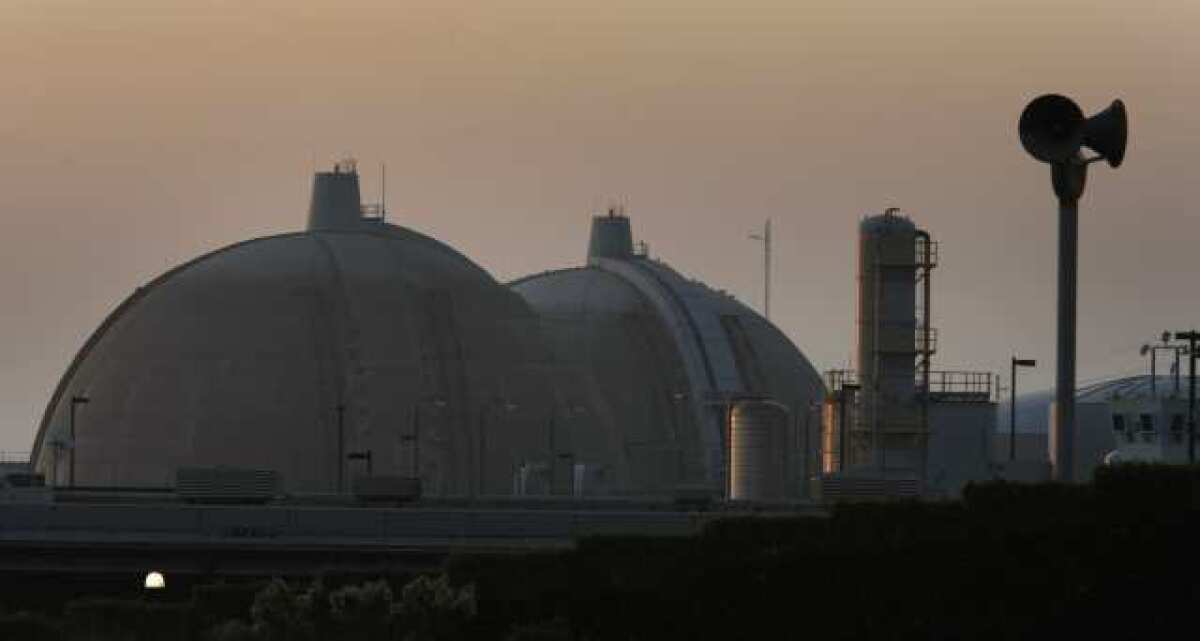Can we please base our climate change discussions on facts?

- Share via
In the debate about global warming, as last week’s climate change town hall on CNN made clear, policy discussions are often based on false premises. In Thursday’s debate, the Democratic presidential candidates will again discuss climate issues. Here are a few faulty assumptions they should reject.
One oft-repeated canard is that we won’t be able to reach zero net carbon dioxide emissions without re-embracing nuclear power. Several candidates responded to this claim last week by saying they could not support nuclear power because it was too expensive and we haven’t solved the waste disposal problem. Both those things are true, but they leave a crucial point out of the discussion.
If it were really the case that we couldn’t meet our energy needs without nuclear power, then we could certainly suck up the cost (currently about double that of solar, and as much as three times that of wind) and get back to work on waste disposal. But the assertion that we can’t decarbonize the energy system without additional nuclear power is flawed.
Experts are divided, but several recent studies outline plausible decarbonization pathways that do not rely on expanded nuclear power. One study, led by the National Oceanic and Atmospheric Administration (NOAA), suggested that the key to making this work is grid integration. We need a system in which power can be moved efficiently from where it is generated to where it is needed, since at any time, somewhere in the U.S., it’s sunny or windy. Creating a more nimble grid would require federal investment, just as building the original grid did. But we’ve done it once, and we can do it again.
A second false premise that invades climate discussions is that China is the world’s greatest greenhouse emissions culprit. China is a big emitter, to be sure, but fingering it as the worst is misleading. Yes, China’s CO2 emissions, as of 2017, were more than double those of the United States, but there are three times as many people in China as in the United States. In fact, per capita emissions are still far higher in the U.S. than in China.
Moreover, a good portion of Chinese emissions are “embedded” emissions — the result of manufacturing goods for export, mostly to Europe and North America. To a great extent, U.S. consumption drives Chinese emissions.
A third false premise is that transitioning to renewables from fossil fuels will displace large numbers of American workers. The problem of displaced workers is real, which is why presidential candidates feel obligated to discuss it. But the issue was given so much attention in last week’s town hall that one might have gotten the impression that large numbers of workers in the fossil fuel industry stand to lose their jobs as we embrace cleaner energy. The reality is that only a small sliver of Americans work in fossil fuel extraction. The U.S. Bureau of Labor Statistics counts about 50,000 in coal, and about 150,000 in oil and gas extraction. Those jobs are held by less than 0.1% of the population, or about 0.2% of the workforce. Of course there is more to the industry than extraction, but even when we add additional jobs — in refining or transportation, for example — they still represent a very small portion of the workforce.
While all jobs are crucial to the people who have them, the issue would be better framed in terms of the broader question of worker displacement by technology and artificial intelligence. One recent study suggests that by 2030 — the same 11-year time frame the U.N.’s Intergovernmental Panel on Climate Change cites for jump-starting the energy transition — the U.S. economy could lose 38 million jobs to automation. That is a potential crisis — one that could drive even greater income inequality, as well as huge disparities in health and well-being. Here, Democrats could stress that the clean energy sector is the economy’s fastest growing job sector, with jobs that are not easily automated or outsourced.
And finally, speaking of false premises, can we just stop focusing on plastic straws? We should reduce plastic waste, by all means, because doing so is good for the ocean. But plastic straws are not what’s standing between us and the renewable energy economy, so let’s not waste attention on distractions.
Naomi Oreskes is a professor of the history of science at Harvard University. She is the author of the forthcoming book “Why Trust Science?”
More to Read
A cure for the common opinion
Get thought-provoking perspectives with our weekly newsletter.
You may occasionally receive promotional content from the Los Angeles Times.









